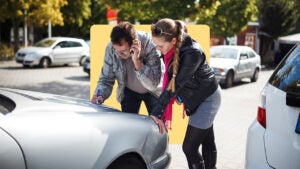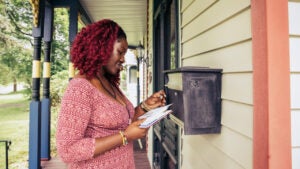What to do when someone wants to “keep insurance out of it”

Maybe you’ve been here before: Somebody sideswiped your car in a parking lot, rear-ended you on your morning commute or crashed into you on your way to the grocery store. Now your car is sporting an ugly dent, and the at-fault driver is asking you to “keep insurance out of it.” They’ve promised to pay for the repairs if you do, and they might even know a guy who can do it for less than your regular mechanic.
Average car insurance rates are on the rise nearly everywhere, which may make it more tempting to go along with the other driver and avoid a potential rate increase — or conflict with the other driver — by contacting insurers. But bypassing insurance means relinquishing the financial protection you pay for when you sign up for a policy. Bankrate’s insurance editorial team talked to experts and real drivers who’ve navigated this situation from both sides to understand how best to deal with the problem of settling car accident costs without help from insurance.
Why people want to “leave insurance out of it” after an accident
When someone asks you to “keep insurance out of it,” they’re likely concerned about one of a few possible things:
- They don’t actually have insurance: The most recent study by the Insurance Research Council (IRC) shows that 14 percent of U.S. drivers had no auto insurance coverage as of 2022. In some states, that number is as high as 25 percent — and if the driver you’re involved with is caught driving without insurance, they could face steep penalties.
- They want to avoid a rate hike: Bankrate’s research shows that full coverage car insurance premiums go up by an average of 42 percent after an at-fault accident. The other driver may be worried about paying higher rates if their insurance company learns about the accident.
- They don’t understand how insurance works: New drivers may be particularly reluctant to involve insurance. They may not know how to file a claim or understand the purpose of their liability insurance. Drivers who don’t understand how insurance works may not trust an insurance company to handle their claims.
With the average cost of car insurance rising sharply in recent years, drivers may be more likely to view insurance companies with mistrust and opt for non-insurance routes for settling costs after an accident. If you’re confronted with this type of request, it’s important to understand your options.
Car repair costs can be unpredictable. It may be tempting to avoid calling your insurance company and face the out-of-pocket cost for damage. But even minor damage can be costly to repair. Bankrate staffer Lane G. shares how costs can quickly become affordable even for a simple fix:
“When I was a new driver, I scraped the car next to me pulling out of a parking lot. It was a small scrape, and the owner came out a few moments after I did it. I was very apologetic and asked if I could just pay for the repair since I, frankly, didn’t know how much car repairs could be. But a small paint job couldn’t be too bad, right? Well, turns out the person’s car was a new BMW he had planned to sell very soon. He called me later with a quote of over $1,000. I was in my very early 20s and broke; I did not have $1,000. I picked my jaw off the ground and said, “Alright, I’ll give you my insurance info.” I remember later, when the insurance agent called to ask me about the incident, she was also quite shocked a paint job would cost that much.”
What are my options if someone doesn’t want to involve insurance?
If you’re in an accident with someone who asks you not to file a claim with their insurance company, you essentially have two options: you can work with them to arrange payment for the damage outside of insurance, or you can get insurance involved.
Bypassing insurance typically only makes sense in a situation where all of the following is true:
- The damage is fairly minor and won’t require extensive or costly repairs
- There are no injuries
- You can trust the other driver’s ability and willingness to pay for the damage they’re responsible for
Car insurance exists because these three things aren’t always the case in a car accident — and it’s not always possible to evaluate damage and injuries accurately at the scene of the accident. Motor vehicle crashes can generate expensive repair costs that are beyond the average individual’s ability to cover, and the legally binding contract of an insurance agreement means you don’t have to rely on an informal promise from a stranger that they’ll pay for your damage. Insurance also provides a system of mediation that holds at-fault parties accountable to pay for damage they caused.
However, in some circumstances, going outside of insurance could simplify things for both parties — so let’s take a look at how you might be able to do it responsibly.
If you want to keep insurance out of it
In certain cases, bypassing insurance could offer advantages to both parties in a car accident. For the at-fault driver, avoiding an insurance claim could prevent a rate hike, while the other party could skip the hassle of filing a claim and waiting for the payout. However, an arrangement like this relies on trust and isn’t without pitfalls.
If you’re willing to honor the other driver’s request to bypass insurance, it’s up to you to take steps to ensure that your repairs are paid for. Keep the following tips in mind:
- Get the other driver’s information: In every state, drivers are legally required to exchange information following an accident — and if the other driver has agreed to personally pay for the damage, you’ll need their contact information to follow up.
- Exchange insurance information: Even if you’ve agreed to keep insurance out of it, make sure that you know the name of the other driver’s insurance company in case they change their mind or refuse payment after the fact.
- Call the police: Summoning police to the scene of an accident provides a valuable official record of what took place. Law enforcement involvement can ensure that you and the other driver exchange the necessary information, and having a police report will be helpful if you or the other driver ultimately decide to file a claim.
- Work with a mechanic you trust: If the other driver assures you that they “know a guy” who can complete the repairs at a cheap price, be wary: you may get what you pay for. Working with a trusted mechanic that you choose is a smart way to avoid shoddy repairs.
- Stay in touch: Get a quote for the necessary repairs promptly, and share it with the other driver. You may want to request payment upfront before getting the repairs done.
- Be ready to call on insurance: A panicked driver trying to stave off a rate increase is likely to underestimate the cost of repairs at the scene of an accident — and when the bill comes due, they may be reluctant or unable to pay.
- Know the timeline to file a claim: If you end up needing to go through insurance, your claim could be denied if you file past the insurance company’s claims filing deadline. In many cases, you’ll have a 30-day window to file a claim, but some insurers may allow more or less time.
If you’re at fault in an accident and want to avoid a claim on your liability insurance, you could follow the same steps, prioritizing clear communication with the other driver.
No matter how trustworthy someone seems at the scene of an accident, it’s best to always get their contact information and insurance details as a precaution. Bankrate staffer Sarah G. shares her experience illustrating the importance of having insurance information to fall back on if necessary:
“Minor accident where the other driver was at fault. I agreed to settle it outside of insurance but still got their info — which was good because they wound up balking at the cost of repairs. They did pay in the end, but I had to gently threaten to use the insurance info I had. Definitely dragged out the process of getting the repair done — would have been a much bigger mess if I hadn’t taken their info down, though.”
If you want to go through insurance
Going through insurance — either yours or the at-fault driver’s — offers convenience and assurance, since that coverage is based on a legal contract and backed by an insurance company that can afford to pay out to cover significant damage. If you’re not comfortable trusting the other party to pay, if anyone was injured or if you need major repairs covered, going through insurance is likely the best option, regardless of the at-fault driver’s wishes.
If you choose this approach, keep in mind:
- The other driver may not have insurance: If the at-fault driver wants to settle outside of insurance because they have no coverage, your only option may be to go through your own insurance. If you have collision coverage, your policy should cover damage to your vehicle regardless of fault. Uninsured motorist coverage may also cover some of your costs, depending on the situation.
- Consider your deductible: If the cost of repairs is close to your deductible amount, it may not be worth it to go through insurance and risk an increase to your premium.
- Look up the deadline for claims: Most insurance companies put a limit on how long after an incident you can file a claim. Typically, you must make a claim within 30 days of the incident, but your insurer may set a shorter deadline and deny any claims made after that time. Check your policy details or contact your agent to find the window in which you’re eligible to submit a claim.
“I got into a minor accident once and the other person told me they wanted to bypass insurance. A month later I got a call from my insurance company that the other driver put in a claim. It’s always a good idea to get the other driver’s info no matter what. In this case, I wish I would have been the one to inform my insurance company first, and I won’t make that mistake again.”
– Lisa M., Bankrate Staffer
Do I have to call my insurance company after an accident?
In general, it’s a good idea to report any accidents to your insurance company — and if you plan to file a claim, you’ll need to notify your insurer of the accident.
However, if the accident was minor and did not involve any injuries, you may not be legally obligated to make a report to your insurer. In most states, drivers are only officially mandated to report car accidents to law enforcement or the Department of Motor Vehicles. In addition, these reporting requirements typically only apply to accidents that involve property damage exceeding a certain dollar amount or injuries of any kind.
For example, New York State requires all drivers to make an accident report to the DMV within 10 days using Form MV-104 if anyone is injured or if the damage exceeds $1,000. The DMV recommends that drivers “should” report an accident to their insurance company but doesn’t list this as a legal requirement. Similarly, the California DMV requires drivers to file an SR-1 accident report with the CA DMV within 10 days of an accident that involves injuries, death or property damage that exceeds $1,000.
The advantage of sending accident reports like the MV-104 and SR-1 to your insurance company is that they provide a detailed record of your involvement in an accident and can help to establish your level of fault and any damages you may be owed. Having this documentation sent to your insurer can help you if you plan to file a claim or if the other driver decides to file a claim of their own.
Failing to report a car accident to your insurance company leaves you vulnerable to insurance fraud, and some of the most common scams are staged car accidents. After asking you not to file a claim, the other driver can report the accident to your carrier and tell their side of the story before you do, usually with exaggerated injuries, to secure a hefty claims payout.— Shannon Martin, Bankrate insurance analyst
How risky is it to leave insurance out of it?
If you decide to settle costs after a car accident without involving insurance, you are essentially taking on all the financial risk associated with that accident — regardless of your degree of fault.
Driving a motor vehicle carries two key types of financial risk: the risk of causing injuries or damage that are beyond your ability to cover and the risk of sustaining those costs without a guarantee that the guilty party will pay. Purchasing full coverage car insurance transfers both of those risks to a car insurance company. By bypassing insurance, you take back all of the risk that your policy covers.
In the case of a minor dust-up, you might decide that you’re comfortable assuming that risk. But consider the situation carefully before giving up the financial protection insurance offers. Asking yourself these questions may help you navigate whether or not you want to involve insurance:
- How well do you know the other driver? If the other driver is a close friend or family member, you might be motivated to help them out — but consider how reliable their promises typically are. If the other party is a neighbor, a coworker or a complete stranger, the risk of this arrangement could increase significantly.
- How serious was the damage? If the cost of repairs exceeds a few hundred dollars, you have two problems: first, the other driver may have underestimated their financial burden and balk at the cost they agreed to cover, leaving you high and dry. Second, your state laws may require you to report the incident. If it’s unclear how extensive the damage is, it may be in your best interest to involve insurance or promptly get a quote for the repairs to make an informed decision.
- Do you have the time and flexibility to chase down payment? One major advantage of having car insurance is that your insurance company takes on the labor of chasing down at-fault drivers and insisting on payment. By leaving insurance out of it, you’ll put the onus on yourself to keep in touch with the at-fault driver — and you have to trust that they won’t ghost you.
“These situations are what you have insurance for,” says Bob Passmore, Personal Lines Department Vice President at American Property Casualty Insurance Association. While it may sound like a win-win for both parties to avoid a potential rate increase, he notes that there is always some level of risk involved when we choose to leave insurance out of it: “It is very common for additional damage to be found during the repair process, or more serious injuries to become evident days after an accident. There are also rules in each state that dictate the circumstances when and for how long you can be surcharged.”
A discussion with your insurer/agent may reveal that the amount of the surcharge won’t be as much as paying for the claim yourself.— Bob Passmore, Department Vice President, Personal Lines, American Property Casualty Insurance Association (APCIA)
The bottom line: Proceed with caution and understand what insurance is for
Settling the cost of a car accident without involving insurance may become more common as the cost of driving spirals upwards, and drivers try to avoid rate hikes and drawn-out claims.
If you’re in this situation — as either the at-fault or injured party — proceed with caution. The potential advantages of bypassing insurance come with significant risks, including having to pay for expensive repairs out of pocket or even facing a costly lawsuit. If you need assurance that your costs will be covered, turn to insurance: that’s what it’s there for.
Why we ask for feedback Your feedback helps us improve our content and services. It takes less than a minute to complete.
Your responses are anonymous and will only be used for improving our website.
You may also like

Understanding your insurance offer after an accident

Car insurance after a hit-and-run in Nevada

What to do with a car insurance claim check



